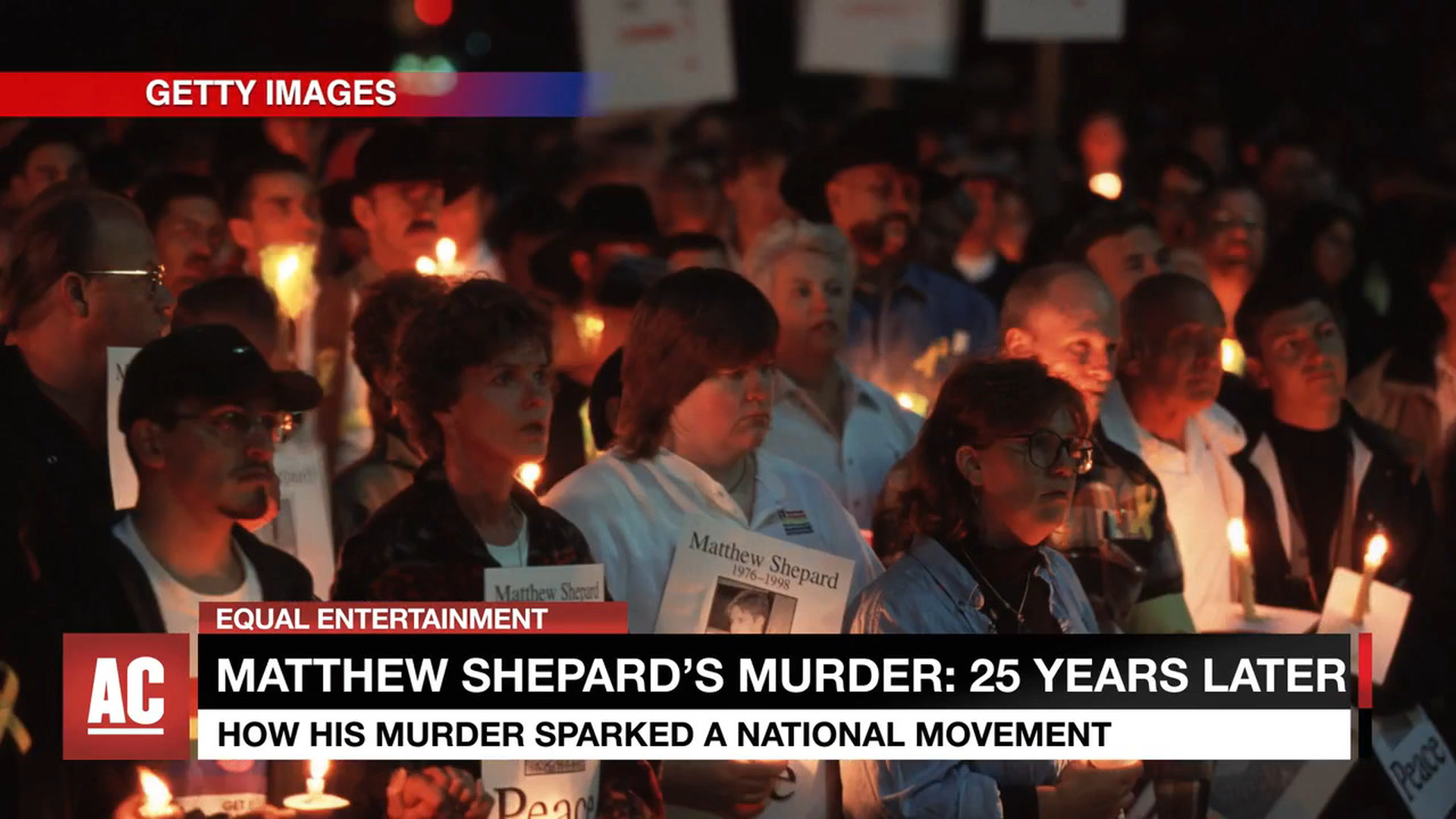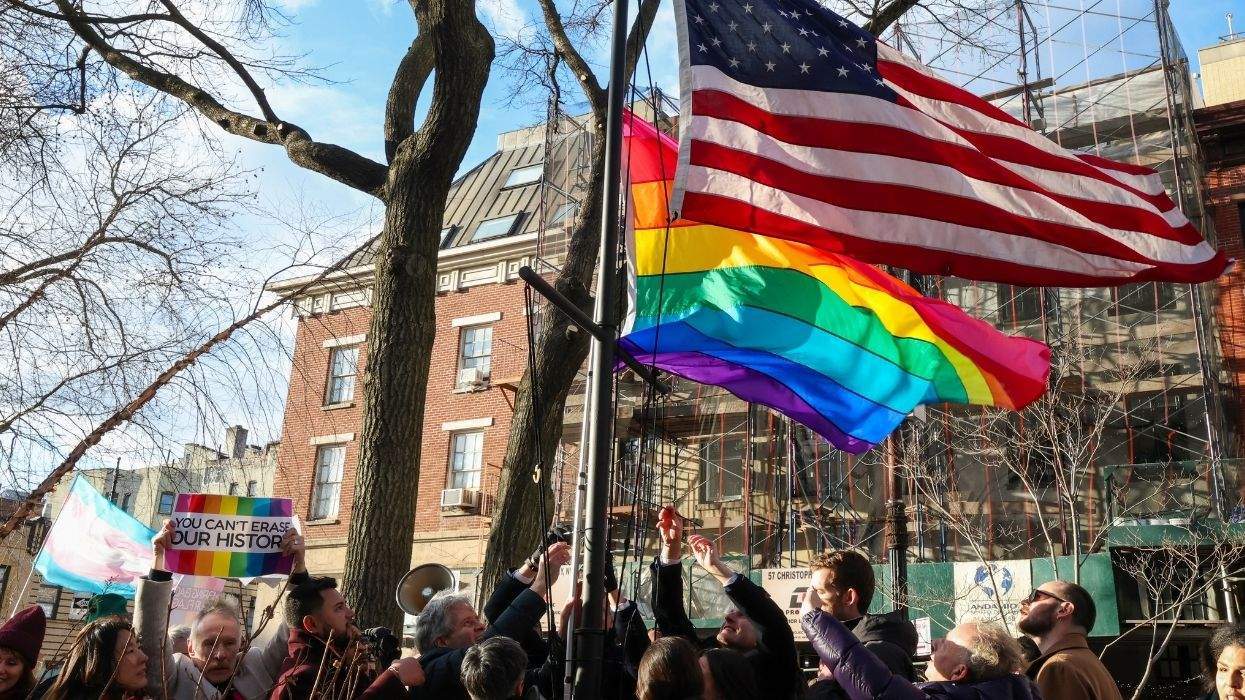Twenty-five years ago this week, Americans — and possibly much of the world — began thinking about anti-LGBTQ+ hate crimes to an extent they hadn’t before.
On October 12, 1998, 21-year-old gay University of Wyoming student Matthew Shepard died in a hospital in Fort Collins, Colo., of injuries he’d sustained six days earlier in Laramie, Wyo. He was savagely beaten by two men he met in a Laramie bar and left hanging on a fence on the city’s outskirts.
Shepard quickly became the face of the victims of anti-LGBTQ+ crimes or, as it was put then, antigay crimes. In the years since, there has been more recognition of the community’s diversity and of hate-crime victims’ diversity, but he remains the most famous victim of such a crime.
After the attack on Shepard, Laramie was overrun with reporters from all over the U.S. His funeral drew protesters from the hateful Westboro Baptist Church of Topeka, Kan., who waved signs with virulently homophobic slogans — which were blocked from the mourners’ view by young people wearing angel wings. The media returned in force the following year, when Shepard’s killers went on trial. Both are now serving life sentences.
Much has changed since then. Matthew’s parents, Judy and Dennis Shepard, established the Matthew Shepard Foundation and have worked tirelessly to raise awareness of all LGBTQ+ hate crime victims and promote LGBTQ+ equality generally. Matthew’s brother, Logan, works with the foundation as well. In 2009, due partly to the family’s efforts, Congress passed and President Barack Obama signed the Matthew Shepard and James Byrd, Jr. Hate Crimes Prevention Act, aimed at enhancing investigation and prosecution of hate crimes. Byrd was a Black man murdered in a racist crime, also in 1998.
Related: What's Changed and What Hasn't Since Matthew Shepard's Murder
The LGBTQ+ community has made great progress in those 25 years. Marriage equality is the law of the land, LGBTQ+ people can serve in the military without having to hide their identity, and coming out is occurring at younger ages than ever. But much hasn’t changed, and progress is being eroded. This year has seen a record amount of anti-LGBTQ+ legislation introduced and passed in states around the nation, much of it specifically targeting transgender youth, and there remains an epidemic of violence against trans people of color.
Wyoming remains one of only four states that have no hate crimes law, let alone one covering crimes motivated by the victim’s sexual orientation or gender identity. Activists have been trying to get one passed for years.
“Five years ago, for the 20th anniversary of the murder of Matthew Shepard, I gave countless interviews, extolling the progress that we’d made in the last 20 years and exhorting my fellow Wyomingites to maintain the momentum and bring us across the finish line: pass a statewide hate-crime law, face head-on the shame and grief over Matthew’s murder so many years ago,” Sara Burlingame, executive director of Wyoming Equality and a former state legislator, tells The Advocate via email. “It felt like this healing was within reach, a fever that was going to break.”
“I was wrong,” she adds. “In the last five years, the Equality State has slid backward, embracing a new form of politics and culture that I barely recognize.”
She had always known Wyoming, she says, as a conservative but live-and-let-live state, where legislators turned back anti-LGBTQ+ bills and people helped one another without prejudice. Now that has changed.
This year the state passed a law excluding trans girls from girls’ school sports in eighth through 12th grades. A bill that would define the provision of gender-affirming care to minors as child abuse passed the Wyoming Senate by a large margin but failed to win House approval, so it didn't become law.
Of course, the backward slide is going on nationwide, despite President Joe Biden’s strong support for the LGBTQ+ community (and, at least in part, in reaction to it).
“It is heartbreaking — and infuriating — to know that 25 years after Matthew’s death, LGTBQ+ Americans are living under a state of emergency,” Kelley Robinson, president of the Human Rights Campaign, said in a statement. “A record number of anti-LGBTQ+ bills were signed into law this year. Transgender people, especially Black transgender women, are being murdered at alarming rates. Libraries, hospitals, and coffee shops that serve and celebrate LGBTQ+ people are being subject to violent threats. Hateful rhetoric is spewed by political commentators, local legislators, and Republican presidential candidates. It’s no surprise, then, that hate crimes — like the one that took Matthew Shepard’s life — are on the rise, targeting not just our LGTBQ+ family, but also BIPOC communities and Jewish people.”
“The fact is that we’re living in a permissible climate of hate,” Cathy Renna, communications director for the National LGBTQ Task Force, told The Advocate. People who are homophobic, sexist, racist, or otherwise bigoted, who might once have been reluctant to express these opinions in polite society, have become comfortable with doing so, she notes.
“We lost ground during the Trump years,” she added. “We’re dealing with a climate that is pretty terrifying.”
Renna was an eyewitness to the immediate effects of Shepard’s murder on Laramie. She was working for GLAAD then, and the day he was found hanging on that fence, October 7, she flew to Laramie to advise reporters on coverage, and she was there when his death was announced and when his funeral was held.
“It was heartbreaking to see the effect on his friends and on the town,” she says. Fellow University of Wyoming students were terrified, and author Lesléa Newman, scheduled to be the National Coming Out Day speaker at the university, was advised that maybe she should cancel. Newman responded that she was scared, but she came anyway.
Area activists stepped up as well, despite the widespread fear. Renna recalls the appearance of the “angels,” organized by Romaine Patterson, a close friend of Shepard’s. “When they came around the corner with those big-ass wings, I was as surprised as Fred Phelps was,” she says, referring to the leader of the Westboro Baptist Church. “From that moment on, he got dealt with very differently. These kids showed him that you could respond to hate with love. It was just stunning.”
During the trial, one of Shepard’s killers tried to use the “gay panic” defense, saying Shepard had made an unwanted sexual advance to him and that caused him to respond violently. The judge in the case ended up not allowing it, and use of this defense and the related “trans panic” defense has now been banned in numerous states. But in 1999, Renna says, she spent an hour and a half talking to reporters about the defense — and debunking it. The case “shifted the way we talk about that,” she says.
Related: New Hampshire Outlaws 'LGBTQ+ Panic' Defense in Homicide Cases
With all the progress on LGBTQ+ rights since then, the backsliding we’re seeing now is frustrating, she notes. Also frustrating to her and others is that other anti-LGBTQ+ hate crimes aren’t as well known. “Twenty-five years later, we’ve never had a hate crime get that much attention,” Renna says. She has tried hard to bring attention to others, such as the murders of Frederica C. Martinez, a two-spirit Native American teen, in Cortez, Colo., in 2001, and Sakia Gunn, a butch Black lesbian, in Newark, N.J., in 2003.
That’s a reflection not only of media bias but of the LGBTQ+ community’s own bias, she says. Shepard was white, attractive, middle-class, a college student. “He had that boy-next-door quality,” Renna says.
Michele Josue, who made the 2015 documentary film Matt Shepard Is a Friend of Mine, told The Advocate that year, “Matt never asked to be the face of the gay rights movement, but for whatever reason, he is. And if it sheds some light on what’s happening to others, in the trans community as well, so be it.”
Renna praises Judy and Dennis Shepard’s work in amplifying the stories of other hate-crime victims. “You can’t say enough about how much his parents have done and his family has done. … Judy and Dennis have used his story to open the door to telling other stories,” she said.
“The reality is that if we don’t keep these stories alive … then we’re really not going to make the progress we want to make,” she adds. As Dennis Shepard told The Advocate in 2015: “History repeats itself unless you educate and teach.”
Renna further noted that while we’re remembering Matthew, “I hope we’re also paying attention to the fact that we’ve marked 20 years since Sakia Gunn was killed.”
Paying attention, she said, is likewise key to combating the anti-LGBTQ+ efforts out there. “The most important thing we can do is pay attention to what’s happening around us,” she said. And speak out and fight back: “If his parents can do the work they do to eradicate hate … the rest of us can do it.”
Robinson issues a similar call.
“We cannot, and we will not, accept this as the new normal,” she said of the homophobic and transphobic political climate. “Instead, I look for inspiration from Judy and Dennis Shepard, who have made it their life’s work since their son’s death, through the Matthew Shepard Foundation, to build a better, more inclusive, more accepting world for all. The onus is on all of us to follow their lead — to speak up against hate, to push our elected leaders to deliver change, and to never back down. We cannot rest until there are no more Matthew Shepards or Sakia Gunns or Dime Does or O’Shae Sibleys or Pulse nightclubs or Club Qs. That is our work. And that is our promise.”
Burlingame added, “We can’t change the last five years, but we can change what happens next. We’ve learned that waiting for others to do the right thing doesn’t work. We must be a people who fight hard for what we love. We must be a people too proud, too stubborn, and too strong to allow others to decide we don’t deserve equality.” She explains that Matthew and those also lost to violence must be honored through legislation plainly saying "hate has no place in this great state."
"The moral of the story," Renna said, "is we have a lot more to get done."
Remembering Matthew Shepard Cathy Renna
















Charlie Kirk DID say stoning gay people was the 'perfect law' — and these other heinous quotes
These are some of his worst comments about LGBTQ+ people made by Charlie Kirk.